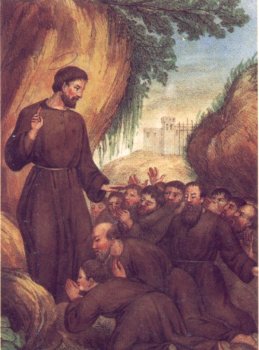"St. Francis translated into life what he wrote in the Rule, offering testimony of daily fidelity to the poor, chaste and obedient Christ. He taught that one should be satisfied with what is necessary, and that one should live in this world as a guest and a pilgrim".
John Paul II
FAR OFF IN TIME...

He surprises everyone when, still fourteen years of age, he decided to embrace the life of the evangelical counsels of poverty, chastity, obedience to which he added a strict observance of a Lenten-style diet. We are still amazed to see how in a time much like his, a time which apparently pays little attention to spiritual values and interior dimension of man, his experience fascinates so many young people of his own age. The community which comes into existence so quickly becomes a referral point for the needs of all. Numberless are the episodes in which he is described as a promoter of reconciliation and which witness to his attention to the problems of his land of Calabria, where he listens to the plea of the people oppressed by abuse of authority of the powerful.
The spreading and vast echo his movement raises, united to the admiration for the works it produces, obtain for him recognition, firstly by the Archbishop of Cosenza, Pirro Caracciolo, in 1470, and then by the Pope, Sixtus IV, 1474. The tormented historical events of his time saw him protagonist much more than his desire for a hidden and humble life would suggest. He was confronted with government problems and social justice problems in the Kingdom of Naples and at the court of the King of France, Louis XI, where he went in 1483, at the invitation of Sixtus IV, and where he remained until his death. Therefore, great political and ecclesiastical events pass through the discernment of a man inspired by the Holy Spirit.
SSt. Francis was a hermit,
but well rooted in his historical reality. The choice of living for God,
through the abandonment of all that is unnecessary, did not make him insensitive
to man's problems. The penitential forms of life he chose were not refusal
of the joy of living, rather the prophetic gesture of the one who affirms
the priority of spiritual values for the life of man over the influence
which comes from the goods of the world. In this journey of purification,
which is freedom from temporal and cultural ties, this man of 1400 today
presents himself again to us, men of the 20th century, as our contemporary.
He is the man who finds in freedom and interior solitude the capability
of being a man who is in tune with other men, a man who is reconciled and
who reconciles others, a man who tells the truth with courage and who is
concerned about the needs of the common people and who is a defender of
justice.
DEEP TRACES...
"Bear fruits worthy of penance through Lenten foods" (IV Rule, ch.6)

The sojourn of Francis in France was, in the plans of Providence, the occasion for a better definition of the penitential charism, received in Paola from God's hands. His hermitic movement gradually takes shape and presents itself in the Church as the last great medieval Order with a Rule of its own, approved in the final form, the fourth, by Julius II, in 1506.
This Rule, which places itself next to other classic Rules of monastic tradition, offers, in evangelical penance, an original form of following Christ, which synthesizes the spiritual plan of the Order of Minims and finds its typical expression in the vow of perpetual Lent.
This vow, lived according to the tradition of the Church, in the sign
and the asceticism of abstinence from meat and its derivatives (by products),
represents a whole style of life that facilitates the daily practice of
Lenten values; that is, a total conversion of mind, of heart and life to
God, with a particular attention to the needs of the brethren.
But, what kind of a man does the proposal of the Order of Minims encounter today?
It is a man who often chases
the myth of self sufficiency and appears focused on himself and his needs.
Nevertheless, this same man also feels the need to go beyond this dimension
and is in a painful and vague search for something deeper. While he appears
to live well within certain confines with which he voluntarily or unknowingly
binds himself, he feels an interior and profound need of liberation. For
this man St. Francis of Paola proposes himself as a call to interiority
and not too much familiarity. He suggests, with his existence that in order
to find himself, to answer the need of happiness which is in everyone,
one is to travel the roads of the desert, understood not only as a physical
place, but as a style of life made of dominion, self discipline and silence,
capable of pervading and organizing one's daily life.

The penitential attitude is not a mortifying attitude, which kills life and condemns it. It is, instead, the acceptance of life in its hardest manifestations. It is capability of meeting with the daily reality of things and people, as they really are and not as we dream them to be. Lenten spirituality presents penance as capability to love to the end, to die every day, to fight that life be free and full. That is the capability of bearing others' suffering, to travel the road with those who struggle, those who search, men who live various kinds of poverty.
The Minims, as faithful interpreters of St. Francis of Paola, are called to live, in a creative and fresh manner, the evangelical beatitudes in simplicity and radicalism, witnessing to our civilization, consumed with the mania of material possessions, that one can truly "be" and that happiness is given not by things, but by the encounter with the living Christ, the Lord of life.
The primary spiritual experience of St. Francis was in his faithfulness to daily personal and community prayer, and that always remains a fundamental necessity for all. The Minim religious find in it strength and reasons to give this witness, which seems to border on the impossible. Prayer, that in the path of the tradition of the Church expresses total and trusting abandonment in God, is in fact the answer to God of the man who believes and finds in God the ultimate meaning of his existence and action; therefore, he gets strength from Him to accomplish all that he asks us to do.
to interiority
The "Minim" rediscovers, through the inner life, the road of humility and simplicity which leads him to stand with trust before God and with hope before his own limitations.
The "lesson" the Minims give to the man in search of his own self is that such a search requires discipline, rigor, capability of detaching him from what is foreign to him.
Approving the Rule of the Minims, Pope Julius II said that they are in the Church like "light that enlightens the penitents". Today how does the Order of Minims fulfill the specific mission given to it by St. Francis and recognized by the Church? There are three aspects of human life about which the Minim charism is more specifically concerned and for which it has solutions.
There are many signs that indicate how man is returning to see his way clear toward an interior dimension, which in so many cases ends up not only in the rediscovery of the religious dimension, but in a real mystic experience. Faced with this search for interiority, the Order of Minims rediscovers and offers its own spiritual patrimony, one of whose peculiar elements is precisely to respond to the deepest desires of our soul.
The spiritual experience of St. Francis of Paola is a full answer to Christ's appeal to conversion and belief in the Gospel. The search for God is always in the first place in his life. The individual ascetical precepts contribute to that research; they are not ends to themselves. The "cave" and the "desert" are real and symbolic places where, through physical solitude and silence, one experiences the return to the deep roots of his own self, in the encounter with God.
the essential
Penitential spirituality leads
not to contempt, but to establishing the right distance from consumer goods
and to considering ourselves pilgrims in a world that doesn't belong to
us, but was given to us only for our use. It urges us also to share with
the least ones the sufferings and margination imposed on the weaker by
the civilization of consumption. Thus penance becomes Charitas, which the
Order of Minims bears as emblem.
We, therefore, feel the need to build on the ashes of a consumer civilization a new civilization founded on the essential respect for nature and its resources, and the acknowledgement that man's aspirations are not satisfied by the gratification of material needs only.
Thus the Order of Minims has a specific role to play in the social
field as well. St. Francis' sons, through a sober style of life, fulfill
the mission of being a sign of the existence of a hierarchy of values at
whose summit is God.

liberation
Penance becomes a force capable
of giving life, that is able to burst out free of any impediment. So the
Minims find perfect harmony in their life: they profess the charism of
greater penance; accept it with the consciousness of being "Minims", the
least, the poor in spirit who need help; and live it open to Charitas,
that is not only their emblem, but the focal point of all their spirituality.
Thanks to their charism, the Minim friars, even in this case,
can offer man their credible call on the road of penance that makes one
free. Austerities prescribed in their Rule have the goal to announce -
provoke liberation - conversion. The condition of detachment from our own
selfishness and fears offers a total freedom in which even the encounter
with "others" becomes liberating.
